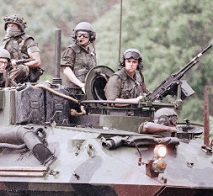
Popular Protests Are Spreading Across Central America, and Washington Is Getting Nervous
Source: The Nation
As mass mobilizations sweep Guatemala and Honduras, the US prepares its usual response: Send in the military.
treet protests over “corruption” in Latin America are often expressly reactionary. Very similar to Tea Party mobilization in the United States, middle-class unease with the redistributionist policies of the region’s center-left governments is leveraged by conservative economic and political elites, and cheered on by the monopoly corporate press, both in country and in the United States (and are often funded by “democracy promotion” organizations based in the United States—either that, or the Koch brothers, who seem to be running their own foreign policy in Latin America). Gianpaolo Baiocchi and Marcelo Silva noted that government protesters in Brazil last year were well-heeled and light-skinned. They are also color-coded, with would-be regime topplers agreeing to don some royalist hue, usually white but sometimes blue.

